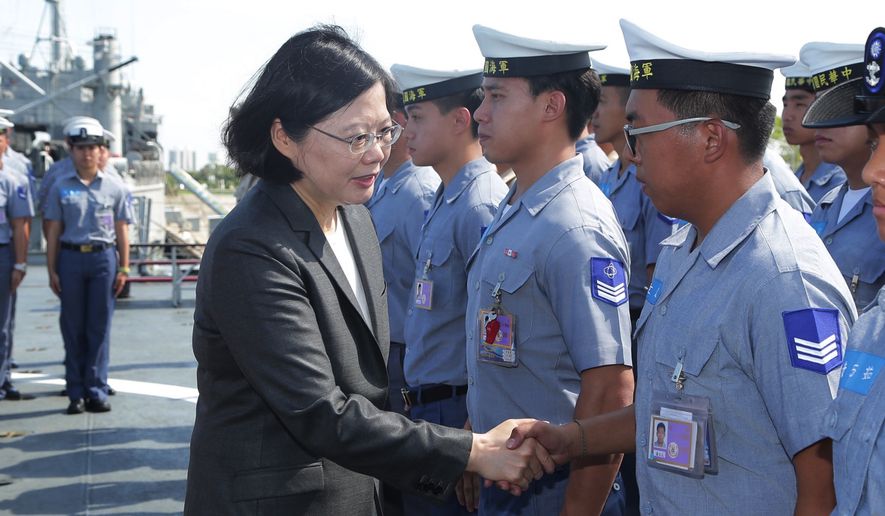China wasn’t the only loser in this week’s decision by an international tribunal over who controls the South China Sea. The Hague-based panel also unexpectedly rejected Taiwan’s claim to a key outpost in the Spratly Islands, and new President Tsai Ing-wen has been much more forceful than Beijing in expressing her displeasure.
Ms. Tsai, who came to office with a reputation of being more confrontational with Beijing, has matched the mainland’s fury at the decision, boarding a naval warship Wednesday and telling the crew to “defend Taiwan’s territory” in the multinational clash over who will control the South China Sea. The warship then set off on a patrol around to disputed Taiping Island in the Spratlys, which Taiwan has occupied for more than 60 years.
The arbitration ruling, handed down Tuesday in a case filed by the Philippines, “has seriously hurt our rights to the South China Sea islands and their relevant waters,” the Taiwanese president said.
While Beijing has so far limited its unhappiness to official statements and street protests, the dispatch of the Taiwanese warship has raised eyebrows around the region and led some to question whether the new Taiwanese president overreacted.
“Ms. Tsai made a serious error in blustering about defending Taiwan’s sovereignty over [Taiping Island] and sending a naval vessel to it as though someone were threatening Taiwan’s claim,” said New York University School of Law professor Jerome Cohen, who writes a blog on the legal issues surrounding the South China Sea dispute.
Mr. Cohen argued that if Taipei disagreed with the tribunal’s conclusion, officials could have done so while still saying they respected international law.
Taiwan “should have given measured, differentiated responses to the many issues decided by the court instead of arousing baseless nationalist anger,” said Mr. Cohen.
But Presidential Office spokesperson Alex Huang said that Taiwan “enjoys rights as afforded by international law and the U.N. Convention on the Law of the Sea over South China Sea islands.” Since Taiwan had not been invited to participate in the case, the government has no reason to recognize the court’s decision.
China has argued that rocky outposts it has built up in and near the Spratly Island group bolster its claim to sovereignty and to the vast natural resources said to lie beneath the sea. But the tribunal gave the Philippines a near-total victory by rejecting those claims and, in addition, held that the Taiwanese-held Taiping Island, also known as Itu Aba, also does not qualify a 200-nautical mile exclusive economic zone that comes with island status.
Beijing, which has long claimed the breakaway Taiwan as part of its own territory, said the two governments could present a united front against the tribunal’s decision.
“Chinese people across the strait are duty-bound and obliged to jointly preserve the ancestral land of the Chinese nation,” said Lu Kang, a spokesperson for the Chinese Ministry of Foreign Affairs, in response to Taiwan’s rejection of the arbitration.
“We cannot just sit idly on our hands,” wrote the China Post in an editorial. “Taiwan … must step up to the plate and refute the [arbitration panel’s] erroneous interpretation of what constitutes an island.”
Asked about Taiwan’s warship diplomacy Wednesday, State Department’s deputy spokesperson Mark Toner said the Obama administration wants to “see a de-escalation of tensions” in the region.
“Everyone in this immediate aftermath or period following the ruling should, frankly, exercise restraint and avoid provocative actions,” said Mr. Toner. “We want to see all claimants take a moment to look at how we can find a peaceful way forward.”
While the U.S. military has challenged Beijing’s increasingly aggressive claims to control of the South China Sea, NYU’s Mr. Cohen suggested that Washington should try to bring Taiwan into negotiations, using whatever means are available to overcome Taiwan’s “lack of formal diplomatic relations with the other players.”
The Taipei Economic and Cultural Representative Office, the country’s diplomatic office in Washington, did not return calls requesting comment at deadline.
• Erica Brosnan can be reached at ebrosnan@washingtontimes.com.




Please read our comment policy before commenting.